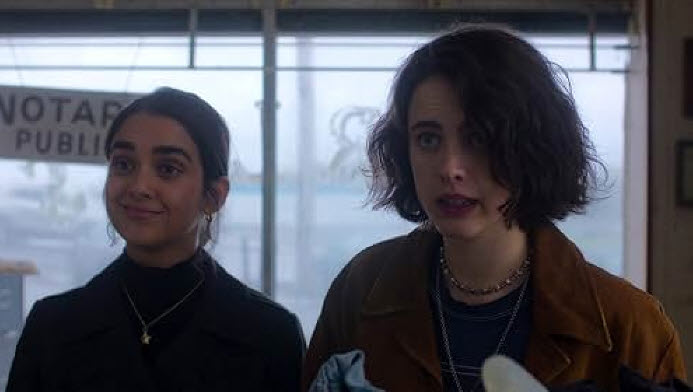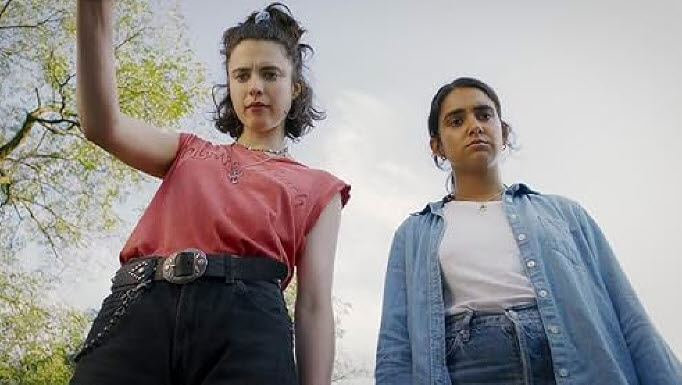In my inconsequential opinion, Joel and Ethan Coen have often swung back and forth between two extreme ends during last several decades. On one end, they can give us extremely wacky comedy films such as “Raising Arizona” (1987), “The Hudsucker Proxy” (1994), “The Ladykillers” (2004), and “Hail, Caesar!” (2016). On the other end, they can serve us adamantly dry comedy films such as “Blood Simple” (1984), “Barton Fink” (1991), “The Man Who Wasn’t There” (2001), and “Inside Llewyn Davis” (2013). Or, they can also do both of these two very different things together as shown in “The Big Lebowski” (1998), “A Serious Man” (2009), and “The Ballad of Buster Scruggs” (2018).
After “The Ballad of Buster Scruggs”, the Coen brothers decided to make movies individually for a while, and their separate filmmaking results are rather interesting to observe. While Joel was totally serious in “The Tragedy of Macbeth” (2021), Ethan goes all the way for wackiness here in “Drive-Away Dolls”, and the question on whether you will like “Drive-Away Dolls” or not depends a lot on how much you can enjoy, or tolerate, the wackiest aspects of their comedy films.
After the exaggeratedly violent opening scene featuring a brief but hilarious cameo appearance by Pedro Pascal, the movie, which is incidentally set in 1999, quickly establishes a complicated relationship between two contrasting young lesbian ladies: Jamie (Margaret Qualley) and Marian (Geraldine Viswanathan). While Marian is your average nerdy girl who loves reading the works of Henry James, Jamie is your typical free spirit who usually acts first before having any thought on action and consequence, and she does not mind at all having a wild sexual fun with her ex-girlfriend Sukie (Beanie Feldstein) even though she is going to be kicked out from Sukie’s residence due to her frequent infidelity.

When Marian is about to visit an aunt of hers in Tallahassee, Florida, Jamie impulsively decides to go along with her. They subsequently go to a local drive-away service center where they may get a car to be driven to Tallahassee, and then there comes a little misunderstanding between them and the manager of the drive-away service center, who happens to mistake Jamie and Marian for the two other figures supposed to take a certain car. Not long after Jamie and Marian take that car and then leave for Tallahassee, those two figures in question eventually come, and it does not take much time for them and their criminal boss come to discern that they have a big trouble to be taken care of as soon as possible.
Having no idea on whatever is being hidden inside the car, Marian and Jamie drive it to the south, and Jamie is already ready to have some more fun along with Marian. Although she simply prefers to finish reading a novel by Henry James, Marian cannot say no when she and Jamie happen to encounter a bunch of young (and horny) schoolgirls at one point, who gladly invite both of them into a little private moment of fun and games.
Meanwhile, those criminal figures continue to chase after Jamie and Marian, and we surely get some laughs as they clumsily try to locate where the hell the girls are now. It gradually turns out that they are working on behalf of a certain prominent public figure in Florida, and one of the biggest laughs in the film comes from when the movie eventually reveals what they try to retrieve.
While its main characters bounce along the story in one way or another, the screenplay by Ethan Coen and his wife Tricia Cooke, who also serves as her husband’s co-writer/co-producer/editor, often catches us off guard with its blatant wackiness. As your average R-rated lesbian comedies, the movie cheerfully features a lot of sex and nudity, and there are also occasional moments of psychedelic style, which do not seem to make much sense on the surface but turns out to be more crucial than expected.
Just like some of the Coen brothers’ comedy films, the movie does a sort of twisted comic puppet play via a bunch of exaggerated comic caricatures, so it is sometimes difficult for us to care about whatever is going in the story. Nevertheless, you may appreciate how its main cast members willingly throw themselves into their broad comic roles. While Margaret Qualley, who has steadily rose to more prominence during last several years, shows more of her comic talent as she previously did in “Sanctuary” (2022) and “Poor Things” (2023), Geraldine Viswanathan is effective as her co-star’s low-key comic foil, and their good comic chemistry throughout the film is one of the main reasons why it works to some degree. In case of several other notable cast members in the movie, Beanie Feldstein effortlessly steals the show whenever she enters, and Bill Camp, Joey Slotnick, C.J. Wilson, Colman Domingo, and Matt Damon are also well-cast in their respective supporting parts.
On the whole, “Drive-Away Dolls” is less satisfying than many of those notable comedy films Ethan Coen made with his older brother, but it is not entirely without fun and entertainment thanks to the game efforts from a bunch of good performers assembled here for the film. I do not know whether the Coen brothers will resume working together later, but both of them demonstrate that they can work separately without much difficulty, and it will be interesting to see how much they can diverge from each other during next several years.









